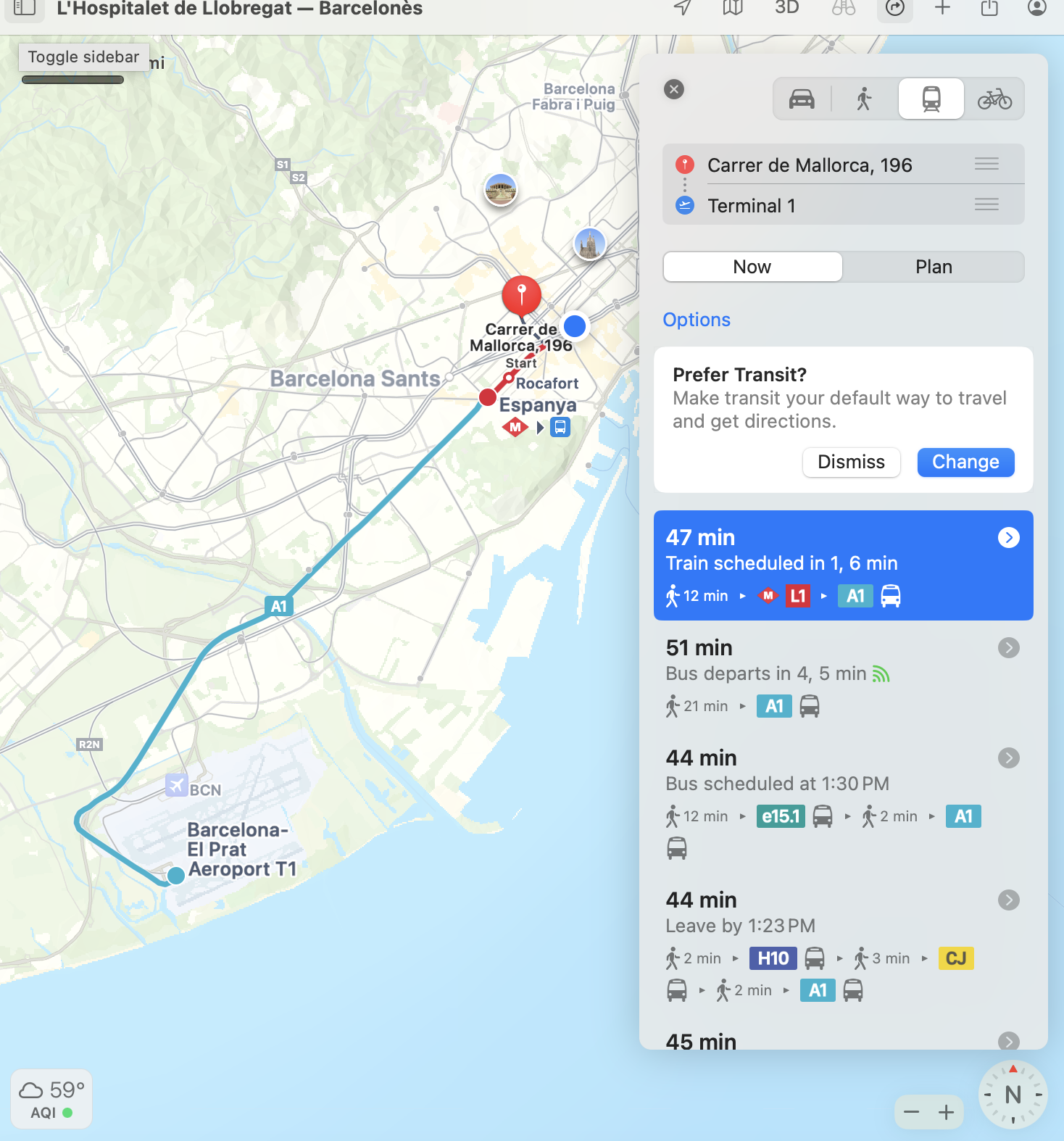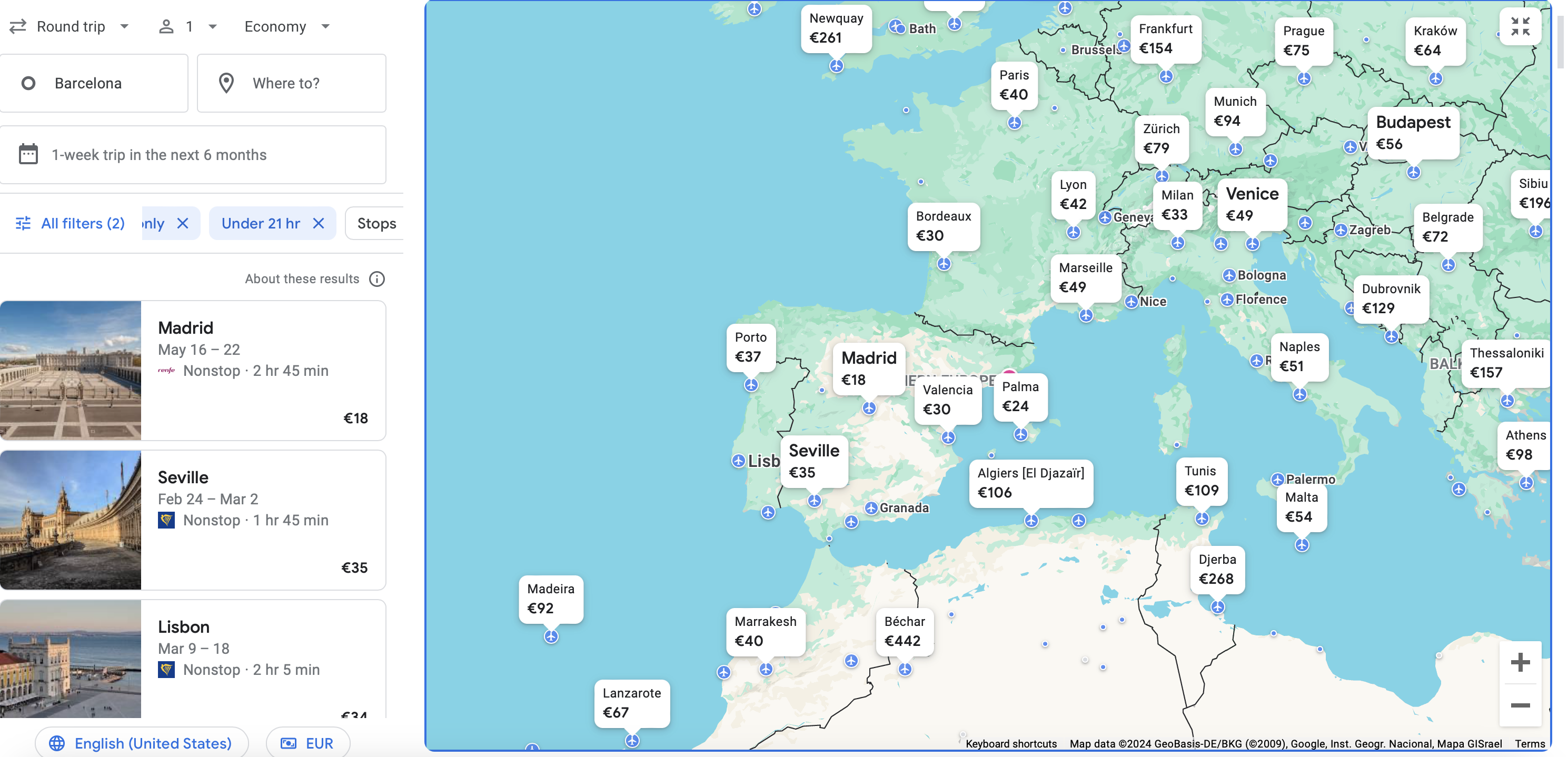One of the beauties of studying in Europe is being able to travel around Europe. IES Abroad enables students to take advantage of this opportunity by holding classes Monday through Thursday. However, if you don't plan ahead, traveling can quickly become expensive and seem fiscally impossible. Here are my tricks for traveling on a budget.
Use Public Transportation
I have a terrible sense of direction and used to be afraid of using public transportation for fear of getting lost. Apple Maps has made it easier than ever to use public transit anywhere in the world. You can search for destinations via their bus and light rail features. Don't forget to research how to buy a ticket.

Public transit can take longer, but it's a huge money saver- taxis to the Barcelona airport can cost upwards of 50 euros one way, while a comprehensive metro ticket costs under five. Budget your time and money to get the most out of your trip.
2. Use Google Flights to find the best deals.
Google Flights compares prices across airlines to help you find the best deal. Its location feature also allows you to see the cheapest time to travel to a specific location. Similarly, you can select a time period, and the service will show you the cheapest places to travel within that time.

3. Travel Light.
Embrace minimalism and travel only with what you need. Wear layers on your flight- you can often take them off and put them in an overhead bin. Bring only a personal item to avoid additional fees on budget airlines like Ryanair. I recommend a backpack like this one - it can fit a laptop, pair of shoes, another outfit, and a few toiletries. Also, consider buying small toiletries at your destination.
4. Avoid restaurants around popular tourist destinations.
Restaurants located near monuments and city centers will almost always be more expensive than those that are not; they're often also tourist traps and may not offer the best quality. Walk a couple blocks away from the landmark or about half a mile outside the city center to find more affordable options.
5. Go to restaurants without an English menu for authentic cuisine.
Restaurants that do not offer English menus are often catered for locals rather than tourists. This is your opportunity to get an authentic culinary experience in the place you are visiting. Use the camera function on the Google Translate app to translate the menu into English.
6. Compare overnight accommodations across different platforms.
Before picking a place to stay, do some research on your options for what's best for you. I like Airbnb, Booking.com, and HostelWorld. I look for distance to public transportation, amenities, whether the room is shared, and whether breakfast is included when choosing an accommodation. Don't forget to check reviews, too.
7. Decide which excursions are worth it for you.
When you're on a weekend trip, you won't be able to see and do everything. Consider which excursions are actually worth it for you. If you don't know where to start, look at Trip Advisor or Airbnb Experiences for possible options. Think about how an experience or excursion will align with your interests, values, time and budget.
When I was in Florence, I chose to spend one day self-touring the city because I would rather look at the architecture on the outside than pay to tour museums. On my second day, I opted to go on a tour of the Tuscany countryside for $45. I knew I wouldn't be able to get with public transit, and a meal was included in the cost.

8. Be wary of "best things to do in...." TikToks.
Often, popular creators will post ads or give cliche recommendations for what to do and where to eat at popular vacation spots. Be wary when viewing this content; see if it is sponsored and look in the caption and comments to see if it's an ad. Cross-check information with microinfluencers to see if it's actually a good recommendation.
9. Bring a reusable water bottle.
You can drink tap water throughout many countries in Europe (but do your research before you do)! In addition, most airports have free water bottle filling stations. Save your money and fill up your own cup.
10. Consider visiting less-traveled destinations.
A ski trip to Switzerland may cost you around $600 for a weekend. If you really want to, go for it. If you'd like a more budget-friendly option, consider a trip to the Alps in Germany or Austria for a similar experience.
Traveling can be expensive, but it doesn't have to be. Keep these tips in mind when planning your next adventure.

Victoria Ernst
Hi, my name is Vic. I'm a junior at Washington and Lee University, and I am a strategic communication and German double major and entrepreneurship minor. I interned in Germany last summer and hope to live abroad after graduation!







